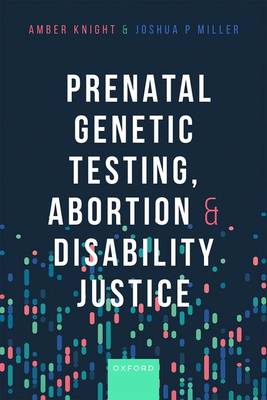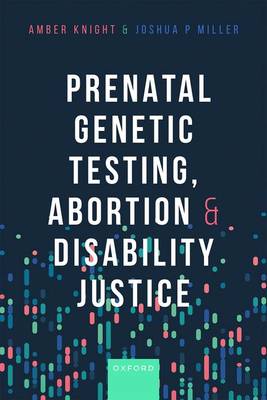
- Retrait gratuit dans votre magasin Club
- 7.000.000 titres dans notre catalogue
- Payer en toute sécurité
- Toujours un magasin près de chez vous
- Retrait gratuit dans votre magasin Club
- 7.000.0000 titres dans notre catalogue
- Payer en toute sécurité
- Toujours un magasin près de chez vous
Prenatal Genetic Testing, Abortion, and Disability Justice
Amber Knight, Joshua Miller
Livre relié | Anglais
193,45 €
+ 386 points
Description
The routinization of non-invasive prenatal genetic testing (NIPT) raises urgent questions about disability rights and reproductive justice. Supporters defend NIPT on the grounds that genetic information about the fetus helps would-be parents make better family planning choices. Prenatal Genetic Testing, Abortion, and Disability Justice challenges that assessment by exploring how NIPT can actually constrain pregnant women's options. Prospective parents must balance a complicated array of factors, including the familial, social, and financial support they can reasonably expect to receive if they choose to carry a disabled fetus to term and raise after birth, causing many pregnant women to "choose" termination. Focusing on the US, the book explores the intent and effects of prenatal screening in connection to women's bodily autonomy and disability rights, addressing themes at the intersection of genetic medicine, policymaking, critical disabilities studies, and political theory. Knight and Miller shift debates about reprogenetics from bioethics to political practice, as well as thoroughly critiquing the neoliberal state and the eugenic technologies that support it. Providing concrete suggestions for reforming medical practice, welfare policy, and cultural norms surrounding disability, this book highlights sites of necessary reform to envision how prospective parents can make truly free choices about prenatal genetic testing and selection abortion.
Spécifications
Parties prenantes
- Auteur(s) :
- Editeur:
Contenu
- Nombre de pages :
- 224
- Langue:
- Anglais
Caractéristiques
- EAN:
- 9780192870957
- Date de parution :
- 23-06-23
- Format:
- Livre relié
- Format numérique:
- Genaaid
- Dimensions :
- 160 mm x 221 mm
- Poids :
- 476 g

Les avis
Nous publions uniquement les avis qui respectent les conditions requises. Consultez nos conditions pour les avis.






